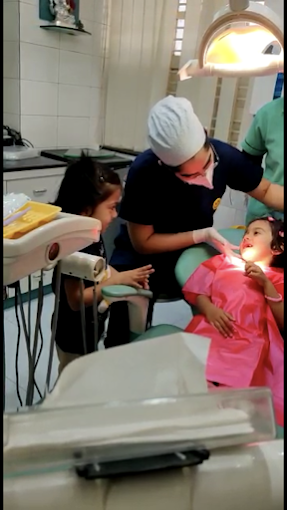Sedation Dentistry
In Pune
The administration of local anesthesia, and sedation general anesthesia in kids, and children are an integral part of standard pediatric dental practice. Children’s dentistry is about understanding child psychology and is not just about getting quality dental treatment done but at the same time instilling a positive dental attitude.
So, let’s understand behavior management – it is how the pediatric dentist and their team “effectively and efficiently” does treatment for the child while “instilling a positive dental attitude.”

The key here, as Dr. Samhita Advani understands, is not just about getting the work done but most importantly that the child is willing to come back for its preventive treatment at follow-ups.
When all behavior management tools exhaust at our end, we look forward to pharmacologically modulating the child’s behavior using sedatives.
We are at Dr. Tooth – The Best Dental Clinic in Pune offers Sedation Dentistry Treatments in Pune.

Let understand it one at a time
Sedation dentistry In Pune uses medication to help patients relax during dental procedures. It’s sometimes referred to as “sleep dentistry,” although that’s not entirely accurate. Patients are usually awake except for those who are under general anesthesia.
Safety is the parents’ top consideration when it comes to their child receiving dental sedation. Dentists may recommend sedation for long, complex procedures and for patients who are especially young or nervous. Sedating a patient is normally a very safe procedure, and parents can help reduce the risks and stress levels for their child before, during, and after the treatment
Oral sedation, nitrous oxide, and intravenous sedation are the major types of sedation dentists provide.
Oral sedation is taken by mouth or through the nose as soon as the patient arrives at the appointment, as the medicine usually takes up to 20 minutes to work. Oral sedation doesn’t put patients to sleep, but it helps them stay calm and relaxed.
Nitrous oxide, or laughing gas, also helps children remain calm. A mask delivers a mixture of nitrous oxide and oxygen, and within five minutes, the patient relaxes and experiences euphoric feelings. At the end of the procedure, pure oxygen is given to the patient to clear out any remaining nitrous oxide.
Intravenous sedation is delivered through a needle inserted into the patient’s vein. This is the quickest route for minimal/moderate sedation. With a stand-by anesthetist by our side who keeps monitoring the child while we complete our dental work, with ease and joy.
Preparing for your child’s
Oral or IV sedation visit
- We have recommended sedation for your child’s safety and comfort during dental procedures. Sedation can help increase cooperation and reduce anxiety and/or discomfort associated with dental treatment.
- Various medications can be used to sedate a child. If your child is undergoing oral (moderate) sedation, medications will be selected based on your child’s overall health, level of anxiety, and dental treatment recommendations. Once the medications have been administered it may take up to an hour before your child shows signs of sedation and is ready for dental treatment. Some children may not experience relaxation but an opposite reaction such as agitation or crying. These are also common responses to the medications and may prevent us from completing dental procedures. Most children become relaxed and/or drowsy and may drift into a light sleep from which they can be aroused easily.
- If your child is undergoing IV (deep) sedation, an Anesthesiologist will administer medications. Unlike general anesthesia, sedation is not intended to make a patient unconscious or unresponsive. In any case, our staff will observe your child’s response to the medications and assist as needed.
- You as a parent play a key role in your child’s dental care. Children often perceive a parent’s anxiety, which makes them more fearful. They tolerate procedures best when their parents understand what to expect and prepare them for the experience. If you have any questions about the sedation process, please ask. As you become more confident so will your child.
For your child’s safety you must
follow the preoperative instructions:
Preoperative Instructions for Oral and IV Sedation in Pune
- Do not say anything that will scare your child such as “The dentist is going to give you a shot”. We will tell them everything that will occur but use language best suited for your child’s age and understanding
- Arrive at our office at the scheduled appointment time.
- We recommend that you bring another adult with you to the sedation appointment. We feel it is very important for you to take care of your child when he/she is in the car seat.
- Please feel free to let your child bring a favorite blanket or stuffed animal to the appointment if he or she is strongly attached to it.
- Dress your child in comfortable clothing. We will be attaching monitors to his/her arms. Loosely fitting clothing is preferable for that reason.
- If your child’s health changes, such as being diagnosed with a condition, problem, or disease within a week of the sedation appointment, please call the office. Also call us immediately if your child has had an injury to his/her head causing loss of consciousness, vomiting, or dizziness.
- Please let us know on the day of sedation if your child has taken any over-the-counter medications within the last 24 hours. This is very important to us and your child’s safety.
- IMPORTANT!!! DO NOT give your child any food 6 hours before his/her scheduled appointment.
- Clear liquids such as water, in SIPS may be given 2 hours before his/her scheduled appointment.
- Oral sedation patients only: You will be given a prescription for the sedative agents to sedate your child DO NOT ADMINISTER TO YOUR CHILD, WE WILL ADMINISTER THE AGENTS IN THE OFFICE
- If you have any further questions do not hesitate to call us: 7028029383; 020-25539383
During the oral sedation appointment
- If any sedative agents are administered to your child before he/she is taken to the treatment room we will ask you to watch your child closely as he/she may become sleepy, dizzy, unsteady, uncoordinated, or irritable.
- You will need to remain next to your child to prevent injuries that may occur from stumbling/falling.
- Keeping your child calm but distracted from unfamiliar surroundings is often helpful.
- You WILL NOT be permitted to remain in the treatment room throughout treatment.
- You or another parent must remain at the office throughout the sedation appointment. You may not leave the office for any reason.
- The doctor and staff will evaluate your child’s health status before he/she is discharged home. Children recover from the effects of sedatives at different rates so be prepared to remain at your office until the doctor has determined your child is stable and the after-effects are minimal.
- At discharge your child should be responsive but may be drowsy, crying, or fussy.
During the IV sedation appointment
- You WILL NOT be permitted to remain in the treatment room during the administration of medications nor throughout treatment.
- The Anesthesiologist will administer medications and your child will become sedated shortly thereafter.
- You or another parent must remain at the office throughout the sedation appointment. You may not leave the office for any reason.
- The doctor and staff will evaluate your child’s health status before he/she is discharged home. Children recover from the effects of sedatives at different rates so be prepared to remain at your office until the doctor has determined your child is stable and the after-effects are minimal.
- At discharge your child should be responsive but may be drowsy, crying, or fussy.


